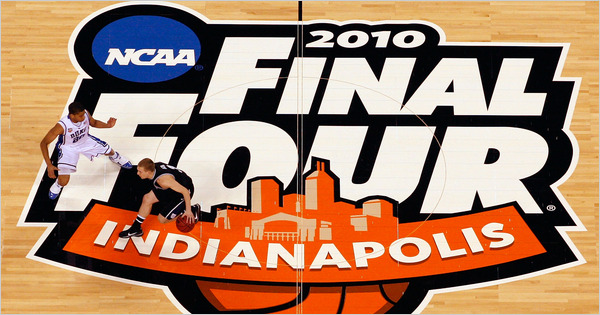Posted by rtmsf on July 7th, 2011
In the past eighteen months, those of us who love college sports — NCAA Division I sports, specifically — have witnessed a series of near-misses that has threatened to overhaul and redefine the games we care about so dearly. The first shot across the bow was the NCAA’s presumptuous near-expansion to a 96-team NCAA Tournament, an idea hatched with dollar signs in its eyes and only quashed when the public and media covering the sport threatened to go Vancouver at the organization’s Indianapolis headquarters. The second shot was last summer’s conference realignment madness, a tumultuous sequence of fits and starts that didn’t as much change the landscape of the six power conferences as it left everyone shaken by just how brazen and inequitable the system underlying major college athletics has become.

Is the NCAA Tournament As We Know It On Its Last Legs? (Getty/A. Lyons)
The point of these two events — neither of which resulted in sea changes, mind you — is that, as the power and influence of the alpha dogs of college athletics rises, we appear to be pushing closer to a tipping point where we’ll no longer discuss what almost happened rather than what did happen. The 74 basketball schools (and 66 football schools) that comprise the ACC, Big East, Big Ten, Big 12, Pac-12, and SEC wield the vast majority of everything — dollars, budgets, fans, television contracts, merchandising, etc. And as their profit margins continue to increase, these schools and leagues are correspondingly irked that their governing body, the NCAA, is getting in their way. Whether they see the future of intercollegiate sports as allowing the payment of players or involving agents or full-cost scholarships or third-party enforcement of rules, these power schools know that ideas ultimately favorable to their bottom lines are often at odds with the other 250+ NCAA D-I schools. This is why, despite existing statements to the contrary, many observers believe that the endgame of all of this wrangling will result in a complete secession of the schools from the major conferences to their own separate entity. Call it the Confederate Collegiate Athletics Association, if you like, but don’t ignore the possibility.
Big Ten commissioner Jim Delaney was recently quoted in a piece by Steve Wieberg at USA Today, and it’s abundantly clear that he (and likely the other power conference commissioners) see an Armageddon-like future to blow up the NCAA as his ‘nuclear option.’
Read the rest of this entry »
| randomness
| Tagged: big ten, jack swarbrick, jim delaney, mark emmert, ncaa, notre dame, power conferences, television contracts
Share this story












































